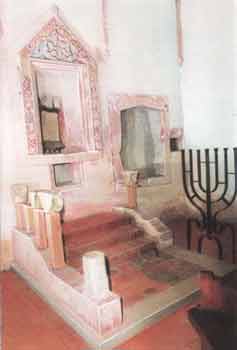A quick update and reminder for those contributing to the volume. If anything seems amiss please email me. (Image: medieval synagogue in Sopron, Hungary)
The York Massacre of 1190 in context: Reassessing relations between Jews and others in medieval England
The mass suicide and murder of the men, women and children of the Jewish community in York on 16 March 1190 is one of the most scarring events in the history of Anglo-Judaism, and an aspect of England’s medieval past which is widely remembered around the world. The York massacre was in fact only one of a series of attacks on local communities of Jews across England in 1189-90. These were violent expressions of wider new constructs of the nature of Christian and Jewish communities and they were also the targeted outcries of local townspeople, whose emerging urban polities were enmeshed within swiftly developing structures of royal government.
This collection of essays will use the events of 1189-90 as a lens through which to reassess the rapid changes which were reconstructing communities and their relationship to royal and ecclesiastical government both locally and in national and European contexts. It will take advantage of the substantial amount of new work which has been done on twelfth-century England, notably on government and local power, ethnic identity, relationships with Europe, the development of distinct regional identities and new intellectual and religious models of community and pastoral care. Our aim is to consider the massacre as central to the narrative of English history around 1200 as well as that of Jewish history.
Two conversations run strongly through the entire collection. One is on the role of narrative in shaping events and our perception of them. The other is the degree of convivencia between Jews and Christians and consideration of the circumstances and processes through which neighbours became enemies and victims.
Contributors to the volume include many of the leading scholars working on English history and literature in the high middle ages including those most closely associated with studies of medieval anglo-jewry. We are also pleased to include the work of several younger scholars, relatively new to the field.
Sethina Watson, University of York, Introduction
Sarah Rees Jones, University of York
York in the Twelfth Century
Paul Hyams, Cornell University
Faith, Fealty, Lordship, and Jewish Infideles in twelfth-century England
Hugh Doherty, University of Oxford,
The sheriffs of Yorkshire and the massacre of 1190
Joe Hillaby
Prelude and Postscript to the York Massacre: Attacks in East Anglia and Lincolnshire, 1190
Nicholas Vincent, University of East Anglia
Richard I: the new Titus
Alan Cooper, Colegate University
1190: Context and Aftermath. Longbeard’s Uprising in London in 1196
Heather Blurton, University of California Santa Barbara
‘Dies Aegyptiae’: From Passion to Exodus in the Representation of 12th Century Jewish-Christian Relations
Ethan Zadoff and Pinchas Roth, CUNY and Hebrew University Jerusalem
England and the Talmudic community of medieval Europe
Eva de Visscher, University of Oxford
Jewish teachers, Christian pupils: the transmission of rabbinic learning from Jewish to Christian scholars in medieval England
Anna Abulafia, University of Cambridge
Notions of Jewish service in twelfth and thirteenth-century England.
Robert Stacey, University of Washington
The Massacres of 1189-90 and the Origins of the Jewish Exchequer, 1186-1226
Robin Mundill, Glenalmond College, Perth
The Legacy of the Archa System after 1216.
Matthew Mesley, University of Exeter
Cures and Conversions: The ‘Jewish Pilgrim topos’ in 13th century miracle accounts.
Carlee Bradbury, Radford College
“Monstrous contact: the Jew at the funeral of the Virgin Mary.”
Hannah Johnson, Pitt University, US
Massacre and Memory: The New Intellectual Politics of Remembering Jewish Martyrdom”
Jeffrey Cohen, George Washington University, US
The Future of the Jews of York
Anthony Bale, Birkbeck College, London
Text, Memory, Event: The Aesthetics of Persecution
A blog for those who attended the conference on 'York 1190' in March 2010 at the University of York.
York 1190: Jews and Others in the Wake of Massacre was organised by Sarah Rees Jones and Sethina Watson of the Centre for Medieval Studies and the Department of History.
The conference was supported by the British Academy, the Jewish Historical Society of England and the Royal Historical Society. The Borthwick Institute republished the essays of Barrie Dobson on anglo-jewish history for the occasion: The Jewish Communities of Medieval England . We are publishing a collection of essays relating to the theme of the conference and developing further related research projects.
The conference was supported by the British Academy, the Jewish Historical Society of England and the Royal Historical Society. The Borthwick Institute republished the essays of Barrie Dobson on anglo-jewish history for the occasion: The Jewish Communities of Medieval England . We are publishing a collection of essays relating to the theme of the conference and developing further related research projects.

No comments:
Post a Comment